Background screening is a critical step in the hiring process, helping employers make informed decisions while protecting their workplaces. While background checks provide valuable insights into a candidate’s history, it's essential to understand their limitations. At Workplace Safety Screenings, we believe in empowering employers with accurate information while setting realistic expectations.
1. Not All Records Are Available Nationwide
Background checks often rely on databases that compile information from various jurisdictions. However, not all courts and agencies report to national databases. Some records can only be found at the county or state level. This means that a comprehensive background check should include both national and local searches to avoid missing critical information. Additionally, database updates are not always immediate, which can lead to delays in accessing the most current records.
2. Time Limitations on Reporting
The Fair Credit Reporting Act (FCRA) places restrictions on how far back certain background information can be reported. For example, non-conviction records older than seven years generally cannot be included. Convictions, however, can typically be reported indefinitely, depending on state laws. Employers should be aware that background checks may not reveal older incidents, even if they are relevant, and state-specific regulations can further limit the scope of reporting.
3. False Positives and Mistaken Identity
Background checks rely on identifiers like name, date of birth, and Social Security numbers. Common names, misspellings, or incomplete information can lead to false positives or mistaken identity. For example, a background check might return records for someone with the same name but a different birth date. At WSS, we conduct thorough verifications to minimize errors and ensure the information you receive is accurate. This includes cross-referencing multiple data points and verifying findings directly with the source when needed.
4. International Records May Be Limited
If a candidate has lived, worked, or studied abroad, accessing their international criminal or employment records can be challenging. Many countries have strict privacy laws that limit the sharing of background information. Additionally, the availability and reliability of records vary by country, with some regions maintaining more comprehensive databases than others. Employers should discuss international checks with their screening provider to understand what’s feasible and how to address gaps in international history.
5. Employment and Education Verification Gaps
While background checks often include employment and education verification, the process depends on the responsiveness of past employers and educational institutions. Some organizations may no longer exist, may have incomplete records, or may only verify limited details, such as dates of employment without job performance insights. To address these gaps, WSS follows up diligently and provides clear reporting on any unverifiable information.
6. Background Checks Don’t Measure Character or Competency
A background check reveals factual data but doesn’t provide insight into a candidate’s character, work ethic, or cultural fit. It also cannot assess job-specific skills or competencies. That’s why it’s essential to combine background screening with thorough interviews, reference checks, and skill assessments. This multi-faceted approach ensures you’re evaluating candidates from all angles.
7. Sealed, Expunged, and Juvenile Records
Records that have been sealed or expunged typically do not appear in background checks. Juvenile records are also often excluded, depending on the state and the nature of the offense. Employers should be aware that even if an incident occurred, it might not show up if the candidate took legal steps to clear their record.
8. Drug Testing and Health Screenings Are Separate
While background checks focus on criminal, employment, and educational history, they do not include drug testing or health screenings. These services are typically conducted separately and require the candidate’s consent. WSS offers comprehensive occupational health screenings alongside background checks to provide a complete picture of candidate suitability.
9. Compliance with State and Federal Laws
Employers must ensure their background screening process complies with federal, state, and local laws. The FCRA mandates that candidates receive disclosure and provide consent before a background check is conducted. Some states, such as California and New York, have additional restrictions on what can be reported and how findings can be used. Failure to comply can result in legal action and fines.
10. Continuous Monitoring Isn’t Automatic
A background check provides a snapshot of a candidate’s history at a specific point in time. It does not include continuous monitoring unless specifically requested. For roles involving ongoing safety or security concerns, employers may want to implement periodic re-screening or continuous monitoring programs.
Making Informed Decisions with WSS
Understanding the limitations of background screenings allows employers to make better-informed hiring decisions. At Workplace Safety Screenings, we provide comprehensive, compliant, and accurate background checks while ensuring our clients understand what the results can and cannot reveal. Our thorough approach includes multi-jurisdictional searches, manual verifications, and clear reporting to support confident decision-making.
If you’re ready to strengthen your hiring process with reliable background screenings, contact WSS today. Our team is here to guide you every step of the way, ensuring you get the insights you need while maintaining compliance and protecting your workforce.

.png?width=500&height=500&name=Blue%20and%20White%20Classic%20Shield%20Financial%20with%20Star%20Logo%20Design%20(1).png)


